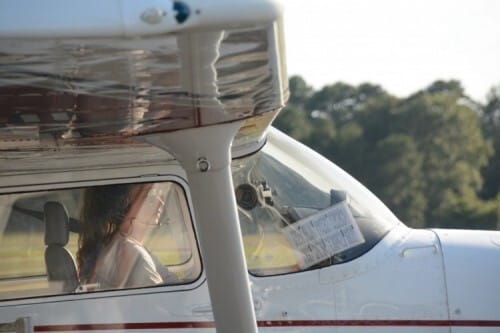
Russell SlaterContributing Writer
Civil Air Patrol is using federal funds from the U.S. Air Force to implement a program designed to help solve a national pilot shortage.
CAP cadets around the nation are enthusiastic about the initiative. Its purpose is to allow them to learn how to fly earlier, enhancing their experience and giving them a head start as they embark on military, commercial and other aviation-focused careers.
The Initiative“Civil Air Patrol is working with its partners on many fronts to encourage America’s youth to pursue aviation careers,” said John Desmarais, director of operations at CAP National Headquarters. “CAP has a long aviation history, and as needs for more aviation-oriented youth are realized, we are expanding existing programs as well as fielding new ones to address the challenges.
“As we move into fiscal year 2019, CAP will be working hard to implement a significant initiative funded by the Air Force to attack the problems on several fronts,” Desmarais said.
Those measures include:
• $1 million for formal flight instruction of CAP cadets, which is expected to lead to about 240 cadets soloing and another 60 earning their Federal Aviation Administration private pilot certificate;
• $400,000 for CAP to provide cadet orientation flights for Air Force ROTC and Air Force Junior ROTC cadets;
• $500,000 for STEM (science, technology, engineering and math) program support that CAP will use to field more kits for squadrons to employ as part of internal aerospace education programs and for teacher members to use in their classrooms. The STEM money will also support maintaining and updating kits to sustain the program; and
• $500,000 to support career exploration activities for CAP cadets.
CAP offers more than 50 National Cadet Special Activities that enable participants to explore careers in the Air Force as well as the aviation industry by becoming a pilot, building and designing airplanes, managing airlines and serving in space command or pararescue.
“We’re also working hard to expand relationships with industry partners like Delta and American Airlines,” Desmarais added. “This is a developing industry-wide issue, and by working together we can not only encourage cadets to consider pursuing military careers, but also either directly or as a step after the military go into commercial aviation. This also incorporates opportunities with accredited university aviation programs as well, encouraging CAP cadets to explore all opportunities.”
Expanding OpportunitiesWendy Hamilton, manager of cadet career exploration programs at CAP National Headquarters, predicts the initiative will help enhance the organization’s contribution to the aviation industry.
“We’re starting to work with the industry to connect cadets directly to opportunities for pursuing careers in aviation-related fields,” Hamilton said. “The program will expand opportunities for our cadets, such as helping them get their private pilot’s certificate and having the funds to get to that milestone.”
CAP cadets impress aviation-related businesses with their focus and experience.
“Cadets are vetted, and are getting out there and doing the work,” Hamilton said. “This program will help them take the next big step. Youth development programs, not just flying on the weekends, but leadership development, character development, good moral groundings, physical fitness training, all of it plays hand-in-hand. Cadets know how to work as a team.”
Cadets with PotentialCadet Chief Master Sgt. Emma Diane Herrington of the Texas Wing is looking forward to the initiative.
“I believe that this program can help answer the needs of the national pilot shortage, and I can’t wait to do what I can to help,” she said. Herrington has 40 hours of flight time and is in the final stages of obtaining her private pilot certificate.
Cadet Capt. Kevin Martinez of the New Jersey Wing heard about the initiative through his flight instructors and CAP senior members.
“I think it is something I would be deeply interested in, as it helps people like me achieve lifelong goals and aspirations that many think are unreachable,” Martinez said. “Some people may not realize the incredible cost of maintaining flight training, and this program would help me and others like me out immensely in that aspect. I think this is just the program our nation’s youth needs to unlock their true potential.”
Martinez’s flight experience dates back to 2014, when he received his first cadet orientation flight at 12. Fascinated with aviation from an early age, Martinez credits his membership in CAP for opening the door to a new world of opportunities. He has received four powered orientation flights as well as two glider orientation flights.
During the summer Martinez logged 11.7 hours of flight time in nine days at the Southwest Region Powered Flight Academy in Shawnee, Oklahoma. “By the end of the week I soloed for the first time! Although it was just a pattern around the one-runway airport, it felt like I had the entire world at my fingertips. It is unlike any other feeling in the entire world.”
Cadet 1st Lt. Aaron Loya, cadet commander of the Georgia Wing’s Bartow-Etowah Composite Squadron, attended the Texas Wing Glider Flight Academy in 2016 and the Southeast Region Glider Academy this summer, where he flew solo for the first time. He recently began working toward obtaining a powered flight certificate, logging about five hours so far.
These cadets and many others stand ready to reap the benefits that will result from the Youth Aviation Initiative. As multiple doors open for opportunities to better their education and future careers, they will continue to work on personal self-improvement while contributing to CAP’s mission of service to communities and the nation.


